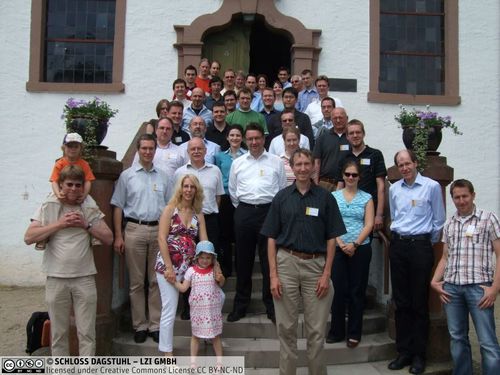Dagstuhl-Seminar 09261
Models and Algorithms for Optimization in Logistics
( 21. Jun – 26. Jun, 2009 )
Permalink
Organisatoren
- Cynthia Barnhart (MIT - Cambridge, US)
- Uwe Clausen (TU Dortmund, DE)
- Ulrich Lauther (Siemens AG - München, DE)
- Rolf H. Möhring (TU Berlin, DE)
Kontakt
Programm
Logistics is the cost aware planning, design, and control of material flow and related information flow (persons, energy, money, information, ...) in production processes. The notion is often used as a synonym for transportation, distribution, or warehouse management. The topic is of a rich variety, has great practical importance, and attracts researchers from the computer science (CS), mathematical programming (MP), and the operations research (OR) communities alike.
Today, problems from logistics are widely studied as parts of the disciplines of mathematical programming and operations research; algorithmics and theoretical computer science; and computer systems. The specific models and methods, as well as the objectives to be optimized, differ in the various disciplines; nevertheless, there are remarkable similarities (as well as significant differences) in the general framework adopted by researchers in logistics in these disparate disciplines.
The primary objectives of the seminar were to bring together leading and promising young researchers in the different communities and practitioners to discuss problems that arise in current and future technology, to expose each community to the important problems addressed by practice and the different communities, and to facilitate a transfer of solution techniques from each community to the others.
There were approximately fifty participants at the seminar, nearly evenly split between computer science, mathematical programming, and engineering and industry.
Six special invited presentations served as introductory lectures on important research areas and application domains and created a common understanding. They were given by George Nemhauser on maritime inventory routing, Jens Baudach and Ronny Hansmann on waste disposal logistics, Ozlem Ergun on humanitarian logistics, Alexander Martin on the power of discrete optimization in logistics, Cynthia Barnhart on trends in airline optimization, and by Patrick Jaillet on probabilistic analysis of routing problems.
This was complemented by an industry day on Tuesday, on which participants from industry and industry-near research institutes presented their research, problems and viewpoints for future research in logistics.
In discussion with the different communities, we organized 27 medium length talks on various recent research results. There was a plenary session on Friday morning to discuss interesting directions for future research and future collaborations. The discussion identified and collected specific needs for future topics such as enabling real time decisions in optimization, a better integration of heuristics and integer programming, dealing with non-observable information through better use of statistic methods, and to exploit game-theoretic aspects in logistics networks.
This seminar was essentially a first meeting of practitioners with the mathematical programming and theoretical computer science community. The general consensus was that both communities learned a lot about the other communities and that it is worthwhile and challenging to continue this form of workshop.
- Cynthia Barnhart (MIT - Cambridge, US)
- Jens Baudach (TU Dortmund, DE)
- Bert Beisiegel (B2 Software-Technik GmbH - Mülheim an der Ruhr, DE)
- Kati Brauer (4flow AG - Berlin, DE)
- Peter Buchholz (TU Dortmund, DE) [dblp]
- Annette Chmielewski (TU Dortmund, DE)
- Uwe Clausen (TU Dortmund, DE) [dblp]
- Wilhelm Dangelmaier (Universität Paderborn, DE)
- Ozlem Ergun (Georgia Institute of Technology, US)
- Armin Fügenschuh (Konrad-Zuse-Zentrum - Berlin, DE)
- Bernard Gendron (University of Montréal, CA)
- Ronny Hansmann (TU Braunschweig, DE)
- Christoph Helmberg (TU Chemnitz, DE)
- Christoph Hempsch (DHL - Bonn, DE)
- Benjamin Hiller (Konrad-Zuse-Zentrum - Berlin, DE) [dblp]
- Dennis Huisman (Erasmus University - Rotterdam, NL) [dblp]
- Stefan Irnich (RWTH Aachen, DE)
- Patrick Jaillet (MIT - Cambridge, US) [dblp]
- Michael Jünger (Universität zu Köln, DE) [dblp]
- Josef Kallrath (BASF - Ludwigshafen, DE)
- Anton J. Kleywegt (Georgia Institute of Technology, US)
- Ekkehard Köhler (BTU Cottbus, DE) [dblp]
- Felix König (TU Berlin, DE) [dblp]
- Ulrich Lauther (Siemens AG - München, DE) [dblp]
- Marco Lübbecke (TU Berlin, DE) [dblp]
- Alexander Martin (TU Darmstadt, DE) [dblp]
- Rolf H. Möhring (TU Berlin, DE) [dblp]
- Petra Mutzel (TU Dortmund, DE) [dblp]
- Boris Naujoks (Log!n GmbH - Schwelm, DE) [dblp]
- George Nemhauser (Georgia Institute of Technology, US)
- Marika Neumann (Konrad-Zuse-Zentrum - Berlin, DE)
- Melda Ormeci Matoglu (Ozyegin University - Istanbul, TR)
- Jakob Puchinger (AIT - Austrian Institute of Technology, AT)
- Jörg Rambau (Universität Bayreuth, DE)
- Louis-Martin Rousseau (Polytechnique Montreal, CA) [dblp]
- Hanno Schülldorf (DB Mobility Logistics AG - Frankfurt am Main, DE)
- Leena Suhl (Universität Paderborn, DE) [dblp]
- Nelson A. Uhan (Purdue University, US)
- Jose Verschae (TU Berlin, DE) [dblp]
- Sascha Wohlgemuth (TU Dortmund, DE)
- Uwe Zimmermann (TU Braunschweig, DE)
Klassifikation
- modelling
- simulation
- data structures / algorithms / complexity
- networks
- optimization / scheduling
- Interdisciplinary with non-informatics-topic: logistics / transportation
Schlagworte
- discrete optimization
- large scale optimization
- logistics
- transport


